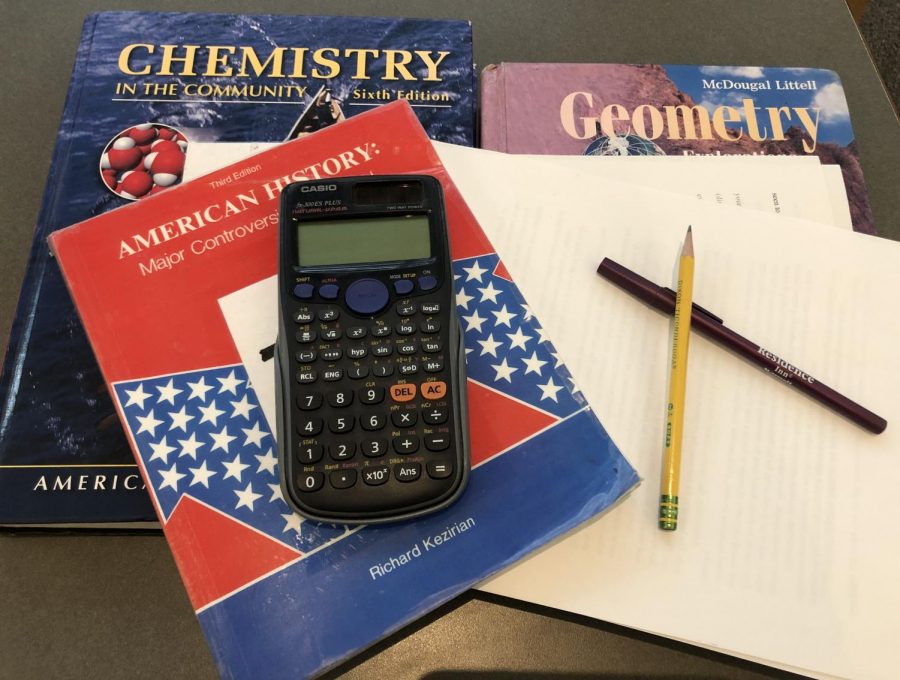Mid term survival guide
Credit: Anna Ilyin
As midterms come nearer for students at WHS, studying for these lengthy exams becomes a crucial aspect of homework and after school routines for many students. One great way of studying is by using a textbook, which can be borrowed from the library media center. Practice review problems until you feel confident about a specific topic.
January 17, 2020
This year’s midterms take place on Tuesday, Jan. 21, through Friday, Jan. 24. The schedule is posted on WSPN.
Biology:
When it comes down to tackling the biology midterm, a lot of it comes down to having the motivation to memorize. Biology is different than the other science midterms, for it is less conceptual thinking and more memorization. With that being said, studying for this midterm is usually pretty straight forward, so quizlets and flashcards serve as a simple and beneficial way to study. If you find yourself with not enough time to make your own study sets, you can most likely find quizlets from other students who have taken the midterm in the past. However, if you do this, make sure the information is accurate!
Physics:
During your preparation for the physics midterm, revisiting your old notes and tests is crucial. Specifically, looking over units or problems you’ve had struggles with in the past is really important to ensure your understanding of the topics. Also, looking over past labs can aid you in re-jogging your memory of the concepts. Study groups can be helpful to keep you motivated during your preparation and can also be fun. And finally, make sure to check in with your teacher with any questions or concerns you may have about the exam.
Chemistry:
When it comes to chemistry, looking back at old worksheets and tests is probably the best way to jog your memory of the previous units. If you’re looking for practice problems to help you prepare, using old problems from worksheets is an easy solution to your problem. Looking over old formula sheets and the periodic table are also very helpful when preparing for the chemistry midterm. Checking in with your teacher with any questions on what formulas or equations you will need to memorize is essential.
English:
For the English midterm, it is extremely important that you have locked down grammar since it will most likely be a portion of the exam. Look over any handouts or packets with grammar practice and complete them until you feel confident that you have mastered grammar and punctuation. Next, go over any vocabulary you studied in the first half of the year. If you have old vocabulary tests, revisit them and try to complete them by covering up your answers. This will ensure that any vocabulary you might have learned, but forgotten, comes back to memory. Finally, if your midterm has an essay or open response portion, plan ahead of time for it. If you were given your prompt before the testing date, then make exact plans and write out a small draft to help prepare you. This ensures that you can immediately start writing and be able to finish your essay with the allotted time.
Math: With many different concepts learned in just half a year during math class, it can be a confusing and overwhelming exam to study for. Because of this, time management is extremely important in the studying process. Make sure to not procrastinate and get, if you received one, your math midterm review packet done. As you solve it, if there are any areas that you have trouble with, make sure to remember them. It is crucial that you feel confident in all areas and topics that you have worked on during the year because many of them could appear on your exam. Any areas that you feel you need improvement in, consult either past note sheets, your teacher’s website with online practice problems on it at WHS’ web page, or your math textbook for lots of practice. If you are still having trouble, meet with your teacher or a tutor to go over certain materials! Looking over old tests and completing them while you cover up the answers is a good idea if you want to practice certain testing problems. Finally, use past review guides, make flashcards, consult practice packets, and ask your teacher for more review material if needed.
History: Memorization and factual information are two important parts of the history midterm. Ensuring that you have memorized concepts, keywords, dates, certain events and more will guarantee a stress-free and easier midterm. To help with this, go over past test review guides and past test questions because there are often repeat questions on the exam, and any other note sheets that were given to you. Also, make sure you know your facts are crucial. Knowing specific details and information will help you be more precise with answers on any multiple-choice portions of the midterm or long response questions. Make sure to revisit each topic you learned and take away the most important things. Making flashcards and reviewing them is a good tool to use for memorization, plus you can use Quizlet or paper flashcards for this. Finally, make sure that you know not only specific facts but also the “why?” and “how?” behind them. A big part of history is understanding what leads up to an event, so review these concepts as well.
Language:
Since WHS offers four language choices – Spanish, Mandarin, Latin and French – each language midterm will be a little different. For languages such as Spanish, French and Mandarin, it is important to first separate your notes into grammar, vocabulary, listening, reading, writing and speaking notes. There will most likely be an oral portion of the exam that will include listening and speaking, and then a reading and writing portion as well. For the oral, it is important to practice a wide variety of oral questions, which you can find on past oral rubrics, or make them up yourself based on any topics studied so far in class. For grammar and vocabulary, look over all of the vocabulary sheets that you received and take out your past vocabulary tests, too. Practice by covering up the answers and doing the tests over again until you feel comfortable with all of the words. Also, practice conjugation and new grammar rules that you may have learned–you can practice this by writing or reading sentences. Because the Latin midterm will be a little different, it is very important to be comfortable with translating. One way to get better at this is to look at all of your past translations and translate everything until you know what you are doing. Review grammar, notes, Quizlets, flashcards, past homework or projects. Also, meet with your teacher or friends to review and work on translations together.





![Last Wednesday, the Wayland School Committee gathered to discuss a number of topics regarding the health curriculum and Innovation Career Pathway course. Another large topic of conversation was the ways to potentially mitigate distracting cell phone usage. "These [phones] are going to distract your learning and social relationships," Superintendent David Fleishman said. "That's concrete right there."](https://waylandstudentpress.com/wp-content/uploads/2025/06/Screenshot-2025-06-04-at-9.49.31 PM-1200x886.png)



























![Troy Hoyt finishes the Boston Marathon, running for the Hoyt Foundation. T. Hoyt is the son of Hoyt Foundation CEO Russ Hoyt.
“[Running a marathon] might seem like a big thing, when it’s presented to you at first, but if you break it up and just keep telling yourself, “Yes, you can,” you can start chipping away at it. And before you know it, you’ll be running the whole 26 miles, and you won’t even think twice about it.” T. Hoyt said.](https://waylandstudentpress.com/wp-content/uploads/2025/04/C36E8761-1CBB-452E-9DF2-543EF7B1095E_1_105_c.jpeg)














































